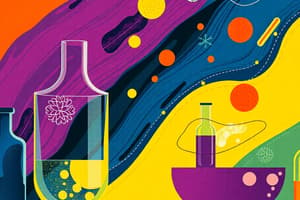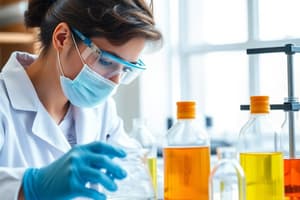Podcast
Questions and Answers
What is the purpose of an experimental design?
What is the purpose of an experimental design?
- To manipulate the dependent variable
- To limit exposure to outside interference (correct)
- To assign subjects
- To define the scientific law
Which variable is manipulated in an experiment?
Which variable is manipulated in an experiment?
- Constant variable
- Independent variable (correct)
- Dependent variable
- Control variable
What is the relationship between scientific law and scientific theory?
What is the relationship between scientific law and scientific theory?
- They are interchangeable terms
- A theory is typically established through an equation
- A law explains why things occur after repeated experiments (correct)
- A theory becomes a law and vice versa
What is the outcome of an experimental investigation?
What is the outcome of an experimental investigation?
What does the experimenter need to do when performing an experiment?
What does the experimenter need to do when performing an experiment?
What is the purpose of defining variables in the scientific method?
What is the purpose of defining variables in the scientific method?
Why is proper equipment essential for experiments?
Why is proper equipment essential for experiments?
What is the role of the control group in an experiment?
What is the role of the control group in an experiment?
What is an example of an independent variable in an experiment testing plant growth under different colors of light?
What is an example of an independent variable in an experiment testing plant growth under different colors of light?
Why are hypotheses important in experimental investigations?
Why are hypotheses important in experimental investigations?
Flashcards are hidden until you start studying
Study Notes
- Scientists design experiments to test hypotheses and expand scientific knowledge.
- The scientific method is a standard process involving defining variables, formulating hypotheses, designing experiments, assigning subjects, and measuring dependent variables.
- Proper equipment is essential for experiments, ensuring both accuracy and precision.
- The experimental design process includes defining variables, formulating hypotheses, designing experiments, assigning subjects, and measuring dependent variables.
- Variables can be classified as independent, dependent, and control.
- The independent variable is manipulated, and the dependent variable changes accordingly.
- Hypotheses are educated guesses about experiment outcomes.
- Experiments have a treatment group, where the independent variable is applied, and a control group, which remains unchanged.
- Subjects can be assigned randomly, and measurements should be taken accurately and precisely.
- The dependent variable's measurements help analyze the data and determine the experiment's outcome.
- An example: testing plant growth under different colors of light.
- Experimental investigations occur in various scientific fields, such as pharmaceuticals, where the effectiveness of medication is tested.
Studying That Suits You
Use AI to generate personalized quizzes and flashcards to suit your learning preferences.




